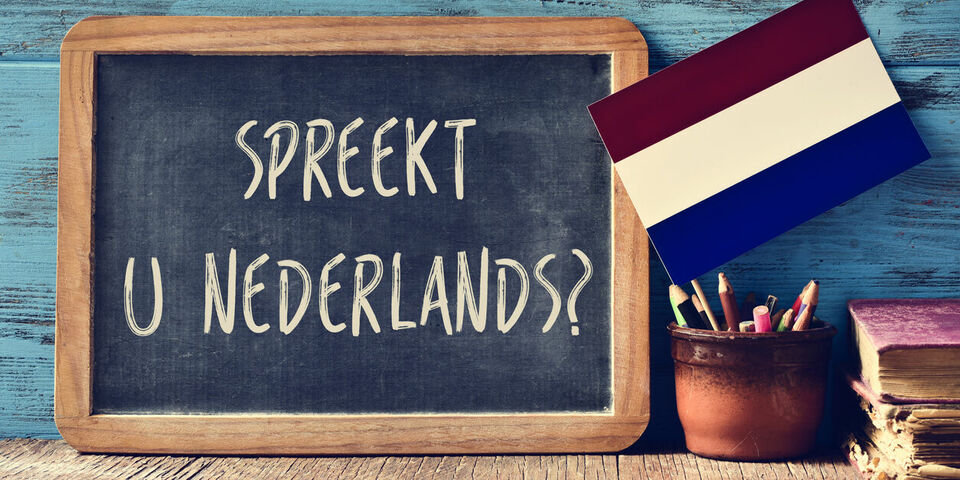New in the Netherlands: Dutch words
Coming from another country to study in the Netherlands, you'll be confronted with so much that's new to you. Not only your degree program but also a totally different culture with its own language and customs. With this series of articles about things that are typically Dutch, we'd like to help you settle into life in the Netherlands. This time we’ll teach you some Dutch words that may come in handy.
Gezellig
If there’s one word that’s truly ingrained in Dutch culture and – possibly because of this – difficult to translate, it’s ‘gezellig’. The first meaning is similar to ‘cozy’ and can be used to describe a nicely decorated home or room, or that feeling you get when you snuggle up to someone under a blanket on the couch with a hot cup of tea. The other meaning of ‘gezellig’ is the nice sensation of being surrounded by other people and a good atmosphere, so it’s reserved for social contexts. To emphasize what a great time they’re having together, people often yell out: “Gezellig hè!” And when you’re saying goodbye after a fun date or dinner party, you’ll also inevitably find yourself saying: “Het was gezellig!” (It was fun!).
Lekker
The literal meaning of ‘lekker’ is ‘delicious’ or ‘tasty’, but its usage is not limited to compliments relating to food and drink. The Dutch, for instance, say things like ‘lekker weer’ (nice weather), ‘lekkere vakantie’ (nice vacation) or a ‘lekkere bonus’. And when something’s really going well, you can say: ‘Het gaat lekker’. ‘Lekker’ may also be used as an affirmative when someone offers you something to eat or drink, instead of a simple ‘ja’ (yes). ‘You want a beer? ‘Lekker.’ You want chips with that? ‘Lekker.’ In addition, ‘lekker’ can precede another adjective to make the latter more emphatic. So you might be ‘lekker druk’ (busy) or ‘lekker warm’. In combination with certain words, ‘lekker’ should almost always be understood ironically. Saying ‘lekker belangrijk’ (important), for instance, indicates that you don’t really see the importance. Last but not least, think twice before referring to a person as ‘lekker’, because this means you find them attractive.
Leuk
‘Leuk’ and ‘lekker’ are often confused by non-Dutchies, because they kind of sound similar and are both positive words. ‘Leuk’ roughly means the same as ‘nice’ and you can use it to respond to an idea or suggestion you like. ‘Leuk’ is fairly neutral and therefore appropriate in a wide range of situations, although this also makes it a bit devoid of meaning. The extent to which you really like something, is often expressed by your intonation. The meaning of ‘leuk’, for instance, can vary from ‘nice, but nothing special’ to ‘extremely cool’. And if you want to convey you’re really into something, you can say ‘superleuk’!
Alsjeblieft
‘Alsjeblieft’ is the Dutch word for ‘please’, aka the magic word that makes any request polite. ‘Alstublieft’ is the more formal version, to be used when you’re not on a first-name basis with someone. Often you’ll only see the abbreviated form ‘a.u.b.’, for example on signs or notes with a general request. ‘Graag’ is another courtesy word, which in some contexts can replace ‘alsjeblieft’, for instance when you order something. An example would be ‘Twee bier, graag’ for ‘Two beers, please’. The phrase ‘Mag ik…’ (‘May I …’) is also used to politely ask for something, in which case you don’t really need to add ‘alsjeblieft’.
Dankjewel
If you want to thank someone in Dutch, you say ‘dankjewel’, a compound consisting of ‘dank’ (thank), ‘je’ (you) and ‘wel’ (well). The abridged ‘dank je’ is also commonly used, as is ‘bedankt’. Note that as more and more people use the English word ‘thanks’, learning the Dutch isn’t strictly necessary, but it does add to the fun of course.
Godverdomme
‘Godverdomme’ is the most common Dutch curse word. It’s derived from ‘God verdoeme mij’, which means ‘May God damn me (to hell)', so it’s really the speaker cursing themselves. Do keep in mind that this is a seriously bad word that’s not appropriate in every situation and that’s seen as disrespectful by some people, in particular religious ones. There are many bastardizations of ‘godverdomme’ that carry less of a charge, such as ‘potverdomme’, ‘verdorie’ and ‘potjandorie’. In informal written language you can also come across the abbreviated version ‘gvd’, which is why GVD doesn’t appear on Dutch license plates.
Hoor
‘Hoor’ is pronounced similar to ‘whore’, so it’s good to be familiar with this commonly used word before you start thinking people are constantly trying to insult you. ‘Hoor’ is an interjection often used as an extra confirmation and is difficult to translate. It often appears following denial or consent. ‘Nee hoor’ constitutes a stronger denial than a simple ‘nee’ (no). ‘Ja hoor’, on the other hand, sounds more polite than a simple ‘ja’ when someone asks you if you’re okay with something, for instance.
Prima
This loanword from Italian is frequently used in the Netherlands to indicate good quality or performance, while at the same time perfectly illustrating the typical level-headedness of the Dutch. This is because ‘prima’ means that you can’t really fault something, but you’re not that excited about it either. ‘Een prima wijn’ (wine) doesn’t taste bad but it’s not excellent either. If you’ve done a ‘prima’ job, you’ve done well but not exceptionally so. Finally, ‘prima’ as a response to a request or suggestion means the same as ‘oké’ (okay).
Proost
The Dutch like having drinks and going out, as they find this very ‘gezellig’. Clinking glasses is of course part of the fun. Although ‘cheers’ is commonly used and widely accepted, it can’t hurt to learn the Dutch version. Proost!
If you’d like to learn more Dutch, register for one of the Dutch courses taught by the TU/e Language Center.




Discussion